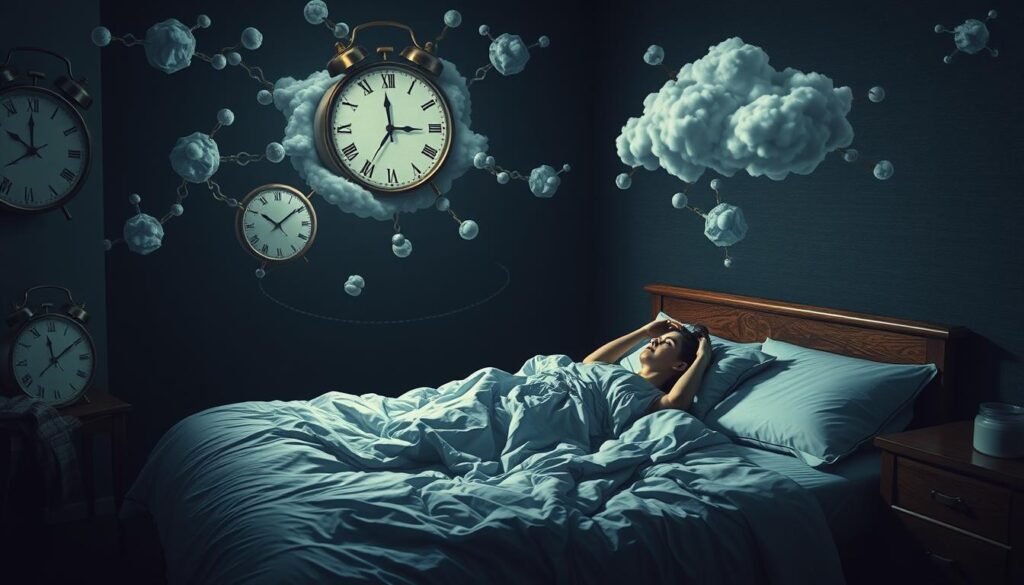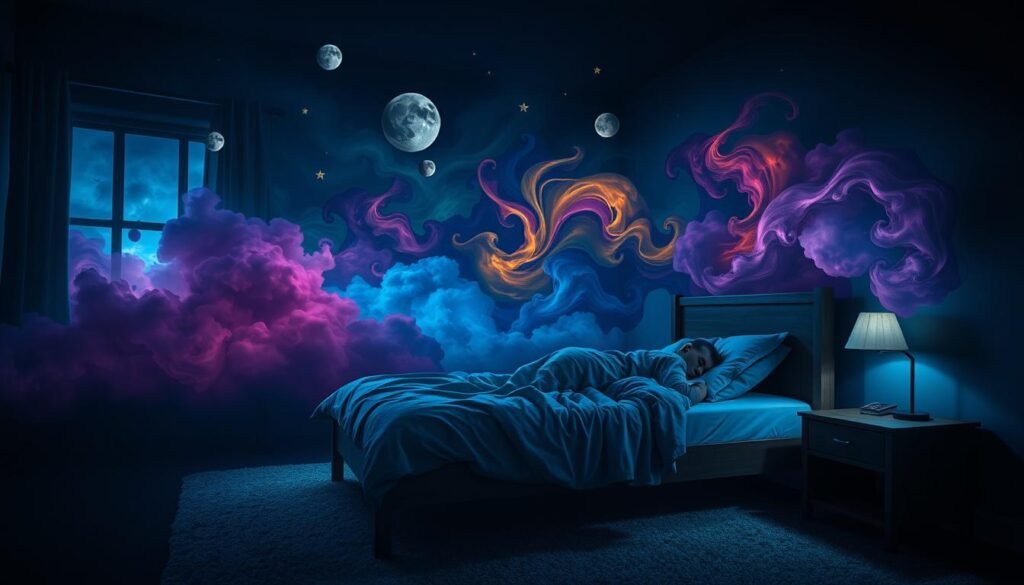More than 60% of people who take prednisone say they can’t sleep well. This highlights a big problem with sleep for those on steroids. Both prescribed users and others face this sleep problem. It can lead to more health issues and lower life quality. So, it’s key to learn why steroids make sleeping hard.
This piece looks at why steroids affect your sleep. We’ll see how corticosteroids mess with sleep patterns. By knowing the side effects and ways to manage them, you can work towards better sleep.
Key Takeaways
- Over 60% of prednisone users experience insomnia.
- High doses and long-term use of glucocorticoids increase the risk of sleep disturbances.
- Withdrawal from steroids can lead to sleep difficulties.
- Corticosteroid medications are often used for managing inflammatory and auto-immune conditions.
- Adjusting medication timing and dosage can help alleviate insomnia symptoms.
- Understanding the role of cortisol and melatonin is crucial for managing sleep quality.
- For more details, refer to medications that may cause insomnia.
Introduction to Steroid Insomnia
Steroid insomnia is about sleep issues when using steroid meds, like prednisone. These drugs are often used to treat inflammation and can relieve symptoms well. But, they can also make sleeping hard. People might have trouble falling asleep, wake up a lot at night, and not sleep soundly.
Studies show that steroids can mess with the body’s natural sleep cycle. This leads to sleep problems. It’s vital to tackle these issues for health. Not sleeping enough can make mental health worse. It can cause more irritability, sadness, and trouble thinking. This creates a cycle of health problems that’s hard to break.
For better health during steroid treatment, aim for 7 to 8 hours of good sleep nightly. Trying the right insomnia treatment methods can help a lot. It’s important to know how steroid insomnia can affect you. This knowledge helps keep your body and mind healthy while on steroids.
What Are Steroids and Their Medical Uses?
Steroids are man-made chemicals similar to hormones in our body. They are crucial for several body functions. There are two main types of steroids used in medicine: corticosteroids and anabolic steroids. It’s important to know the difference. Each serves unique purposes but can also cause serious side effects like steroid insomnia.
Types of Steroids: Corticosteroids vs. Anabolic Steroids
Corticosteroids, like prednisone and dexamethasone, help reduce inflammation. They’re used to treat conditions such as:
- Asthma
- Arthritis
- Chronic obstructive pulmonary disease (COPD)
- Autoimmune diseases
These drugs come in forms like tablets, inhalers, nasal sprays, and injections. Conversely, anabolic steroids are misused for boosting athletic performance and muscle growth. This misuse can lead to harmful health effects.
Conditions Treated with Steroids
Steroids help manage many health issues. Their uses include:
| Condition | Type of Steroid | Common Form |
|---|---|---|
| Asthma | Corticosteroids | Inhalers |
| Rheumatoid Arthritis | Corticosteroids | Tablets |
| Severe Allergic Reactions | Corticosteroids | Nasal Sprays |
| Muscle Wasting Disorders | Anabolic Steroids | Injectables |
| Inflammatory Bowel Disease | Corticosteroids | Tablets |
Steroids are very useful against inflammation and more. Yet, they can cause side effects like insomnia when used long-term. Knowing about these effects is key for proper use and care.
Understanding the Mechanism Behind Steroid-Induced Insomnia
Steroid-induced insomnia is linked to how cortisol and melatonin work. These hormones help control our sleep cycle. Normally, cortisol rises in the morning to keep us awake and decreases at night to help us sleep. But using steroids, especially corticosteroids, can throw off this balance. It causes cortisol to stay high at night, making it hard to fall asleep. This leads to nights where sleep is hard to find.
How Cortisol Levels Affect Sleep
Taking steroids can make cortisol levels high at night. This makes getting to sleep tough. It can cause steroid insomnia symptoms like trouble falling asleep and waking up often. Studies have shown these sleep problems are common with corticosteroid use. They affect how well patients sleep. For example, dexamethasone can make REM sleep start later and shorten its duration. This lowers the quality of sleep. Choosing the right ways to handle this is key to better sleep.
The Role of Melatonin in Sleep Regulation
Melatonin is key for sleep but steroids can lower it. This can make insomnia worse, making good sleep hard to get. The imbalance between melatonin and high cortisol hurts sleep and mental health. Boosting melatonin levels can help. This involves changing light exposure and trying relaxation techniques. For deeper understanding on how steroids affect sleep, check out this review.

Common Side Effects of Steroids on Sleep Quality
Corticosteroids, like prednisone and dexamethasone, are used to reduce inflammation. Yet, they often cause corticosteroid side effects that harm sleep quality. Many people taking these drugs have trouble sleeping. The problem gets worse with higher doses taken in the evening.
Impact of Corticosteroids on Sleep Patterns
Those using corticosteroids frequently find their sleep disrupted. Studies suggest many experience insomnia due to increased cortisol and other factors. Research from the Boston Collaborative Drug Surveillance Program links higher doses of prednisone to more psychiatric reactions.
| Prednisone Dose (mg) | Percentage of Patients Reporting Reactions |
|---|---|
| ≤ 40 | 1.3% |
| 41–80 | 4.6% |
| > 80 | 18.4% |
Using anabolic steroids without a prescription also harms sleep quality. Users often have restless nights filled with anxiety and irritation. When they stop taking the steroids, their sleep quality drops. This effect can last for weeks.
Illicit Steroid Use and Its Consequences
Long-term use of anabolic steroids can lead to obstructive sleep apnea. It can also cause a lot of sleep problems, making sleep quality worse. Whether used with a prescription or illegally, steroids negatively affect sleep. The problems can continue even after stopping their use.

Does Steroid Insomnia Affect Everyone?
Steroid insomnia affects people differently. What causes sleep issues can vary. It’s important to know these differences to better manage them.
Factors Influencing Sleep Disturbances
Factors affecting steroid insomnia include:
- Dosage: Taking higher doses of drugs like prednisone can make you more alert. This increases the chance of having trouble sleeping.
- Duration of Use: Using steroids for a long time can make sleep problems worse. It changes normal sleep patterns because it acts like the body’s natural cortisol.
- Personal Health Conditions: People with sleep issues may find steroids make their insomnia worse.
- Individual Response: Everyone’s body reacts differently to steroids. This affects how likely they are to have sleep problems.
- Timing of Doses: Taking prednisone in the morning can help avoid insomnia.
To fight steroid insomnia, doctors look at what causes it for each person. They may suggest sleep aids like melatonin or suggest better sleep habits. Improving sleep routines can make a big difference in sleep quality.

Recognizing the Symptoms of Steroid-Induced Insomnia
Steroid-induced insomnia affects people differently, making daily life tough. It’s key to know these symptoms for proper care. Some have trouble sleeping, while others suffer from ongoing sleeplessness. This pushes many to seek help for their sleep issues.
Mild vs. Severe Insomnia Symptoms
Insomnia symptoms from steroids range widely. Mild issues often include:
- Difficulty falling asleep
- Frequent awakenings during the night
- General restlessness
On the severe end, symptoms may involve:
- Chronic inability to sleep
- Extreme fatigue during the day
- Inability to concentrate
About 73% of those on corticosteroids face sleep disorders. It’s crucial to recognize these symptoms for effective treatment.
Associated Mental Health Issues
Along with sleep problems, mental health can worsen due to steroid-induced insomnia. Around 40.5% of patients may get depression, and 27.8% might experience mania. Anxiety also becomes more common, harming mental health further.
Corticosteroids can cause severe psychological effects. Symptoms often include:
- Increased anxiety
- Depression
- Apathy
- Occasional instances of psychosis, including hallucinations
Addressing mental health is critical for those dealing with steroid insomnia. By understanding how these issues connect, treatment can improve.
| Symptom Type | Mild Symptoms | Severe Symptoms | Mental Health Issues |
|---|---|---|---|
| Difficulty falling asleep | ✔️ | No | No |
| Frequent awakenings | ✔️ | No | No |
| Chronic sleeplessness | No | ✔️ | No |
| Fatigue | No | ✔️ | No |
| Depression | No | No | ✔️ |
| Anxiety | No | No | ✔️ |
Understanding the Duration of Steroid Insomnia
The way steroids affect sleep can differ a lot from person to person. People who use steroids for just a short time often sleep better soon after they stop taking them. However, those who use them for a long time might have sleep problems even after they stop. Knowing these differences helps both patients and doctors prepare for any sleep issues that might come up when stopping steroids.
Short-Term vs. Long-Term Use Effects
Short-term steroid users usually get back to normal sleep soon after they quit the medication. This improvement happens quickly because the body adjusts to not having steroids. But, people who have been on steroids for a long time may struggle with sleep for a while. This is because their bodies take longer to get back to a normal hormonal balance. Understanding this can help in dealing with sleep problems better.
Withdrawal Symptoms and Sleep Problems
Stopping steroids can lead to different withdrawal symptoms, including changes in how well you sleep. This can include insomnia, and it might take weeks for the body to fully adjust to being without the medication. These issues show why it’s crucial to have strategies, like good sleep habits, to recover from insomnia caused by steroids. It’s also helpful to learn about other ways to improve sleep during this time. Stress and anxiety can make sleep issues worse. For more tips on dealing with sleep problems, check out this link.
| Duration of Effects | Short-Term Use | Long-Term Use |
|---|---|---|
| Insomnia Resolution | Quick Recovery | Prolonged Issues |
| Withdrawal Symptoms | Minimal | Significant |
| Adjustment Period | Days | Weeks |
| Support Strategies | Basic Sleep Hygiene | Comprehensive Management |
Managing Steroid Insomnia: Practical Strategies
To tackle steroid insomnia, mix medication tweaks and good sleep habits. Changing medication times and adopting healthful routines can greatly improve sleep during steroid therapy.
Adjusting Medication Timing
Take steroids in the morning to match your body’s cortisol cycles. This helps decrease night-time sleep problems. A simple schedule change can prevent the sleepless nights often caused by taking steroids later.
Implementing Sleep Hygiene Practices
Good sleep hygiene is vital for beating insomnia. Keep a steady bedtime, make your bedroom comfy, and cut down on screen time before sleep. These steps better sleep quality and help normalize sleep schedules, making nights more restful.
Relaxation Techniques to Improve Sleep
Try relaxation methods like deep breathing and mindfulness to ease insomnia-related anxiety. Studies show these techniques help calm the mind, aiding in relaxation and better sleep. Using these tactics together can effectively counter steroid-induced insomnia.